Ian Paterson: Why have private patients not been compensated?
- Published
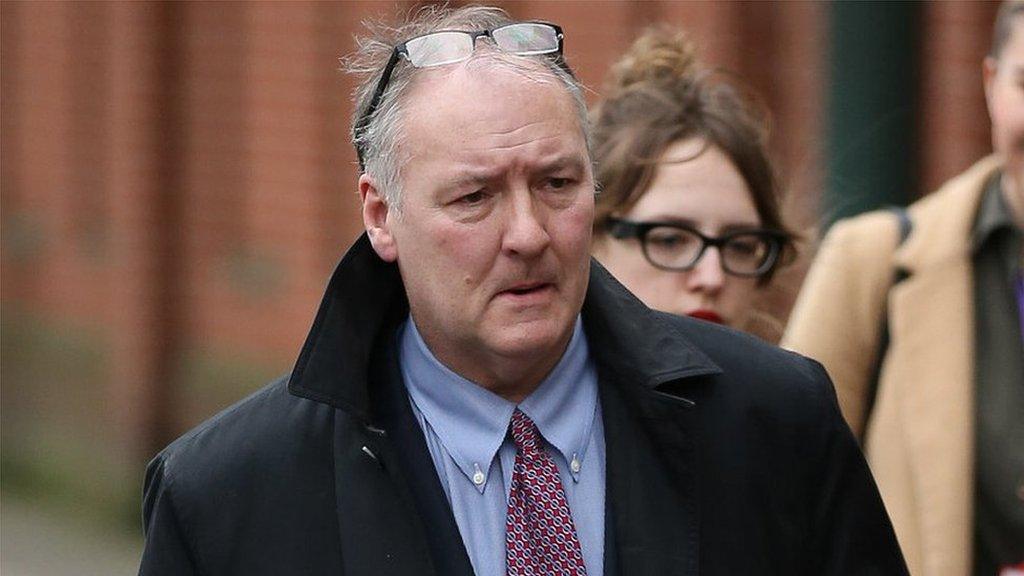
Ian Paterson was described as a "monster" by one of his victims
Patients taking out private health insurance expect to get the best treatment, but what happens if things go wrong? While the NHS has paid out millions to the patients of disgraced breast surgeon Ian Paterson, his private patients are still seeking compensation. Why?
Paterson was jailed for 15 years last month after being convicted of intentionally wounding his patients. His trial heard he exaggerated or invented the risk of cancer in order to persuade people to go under the knife.
While the case centred on nine women and one man, there were in fact hundreds of other victims, many of whom were treated privately by Paterson at Spire Healthcare, in the West Midlands.
One such patient is Patricia Welch, who underwent a mastectomy and reconstruction after Paterson told her, wrongly, he had found a "ticking bomb" of cancerous cells in her breast.
"I don't think you can ever get over it, because you've got it looking back at you in the mirror every morning," she said.
"What he did - it will never go away. When you go private, you think you've got the best."
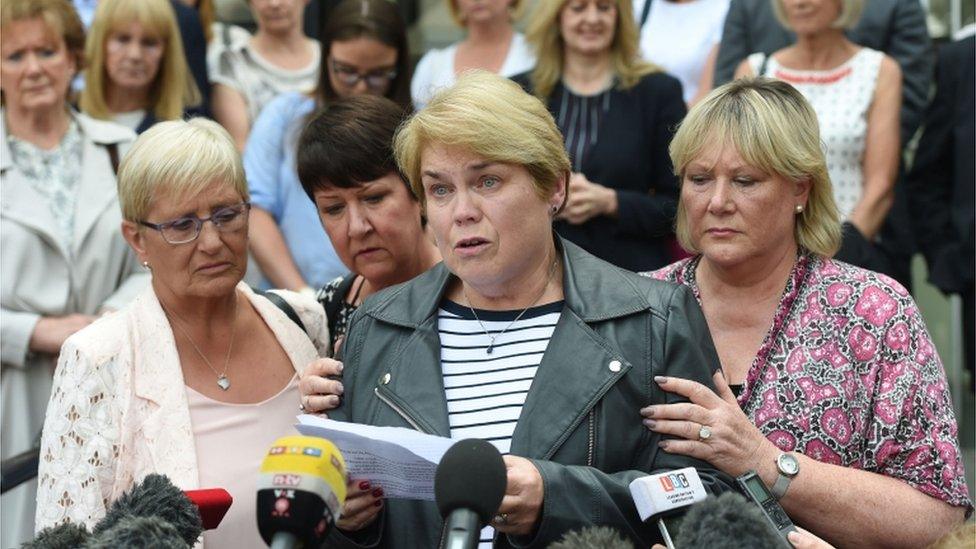
Patricia Welch, centre, was one of 10 patients who gave evidence in Paterson's trial at Nottingham Crown Court
It is a view shared by many - and one of the main reasons people are prepared to pay hundreds of pounds in health insurance each year.
While the vast majority of private operations are carried out correctly - and private patients are typically treated sooner than their NHS counterparts - the service they receive if things go wrong is not necessarily better.
The key difference between the NHS and private healthcare experience is insurance. In the public sector, the NHS is liable for compensation as doctors are employees. In the private sector, the insurance burden falls on surgeons because they are operating as contractors.
"The hospitals are insured for their legal liabilities - the technology, the nurses, the building and the infrastructure," said Neil Huband, of the Private Patients' Forum, which supports patients in the sector.
"The doctor, however, is in charge of the case and assumes authority for the welfare of the patient. No doctor is allowed to operate in a private hospital unless he is insured."
As a result, hundreds of Paterson's victims are having to pursue compensation through the courts while their NHS counterparts have already received payouts.
However, if a surgeon's conduct is held to be criminal, there is no guarantee his or her insurance will be valid.

The Paterson scandal
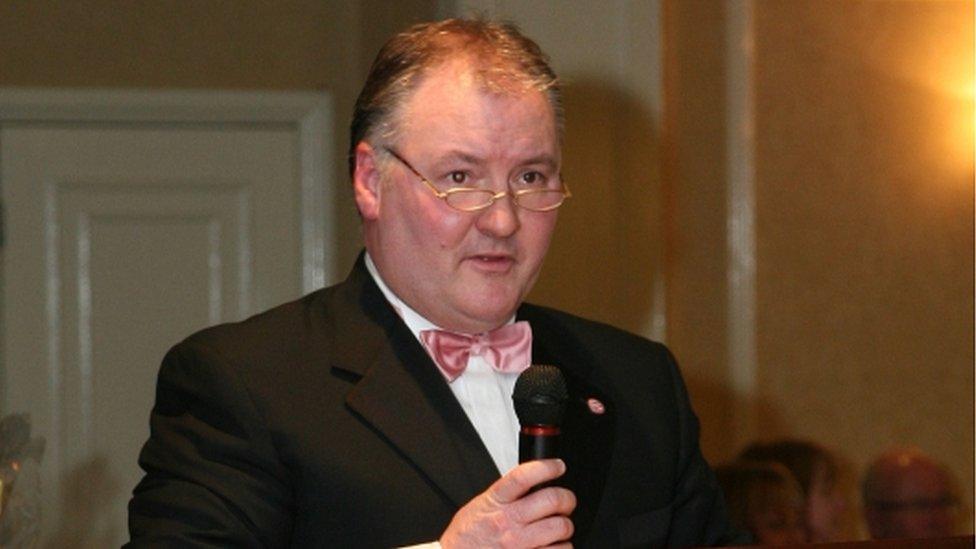

Linda Millband, national lead lawyer for clinical negligence at legal firm Thompsons, is acting for more than 500 of Paterson's former private patients.
She said private policies have very stringent restrictions, which can be revoked in cases of criminal activity, meaning the patient is not necessarily covered.
"So people are not as safe in the private sector as they are in the NHS because policies are subject to review, so even if you sue somebody, if the insurers say it is criminal conduct it falls outside the policy," she said.
"It's really bad and before this case I don't think anyone realised it could happen."
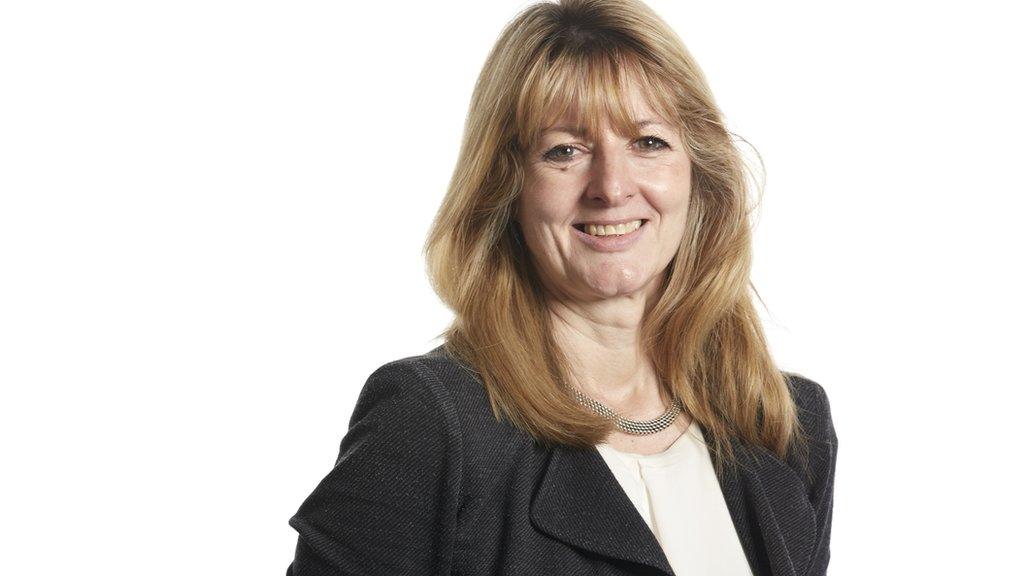
Solicitor Linda Millband said private healthcare was "a bit of a Wild West"
Her firm has set up a campaign called Patients before Profit, which is calling for the same governance and accountability in the private sector as the NHS.
"Private healthcare is a bit of a Wild West," she said.
"There's not really the same level of accountability. The system relies on consultants complying with the rulebook and making admissions when things go wrong - which doesn't always happen.
"The hospitals take the profits from the operations but they are not paying back to the client when things go wrong."
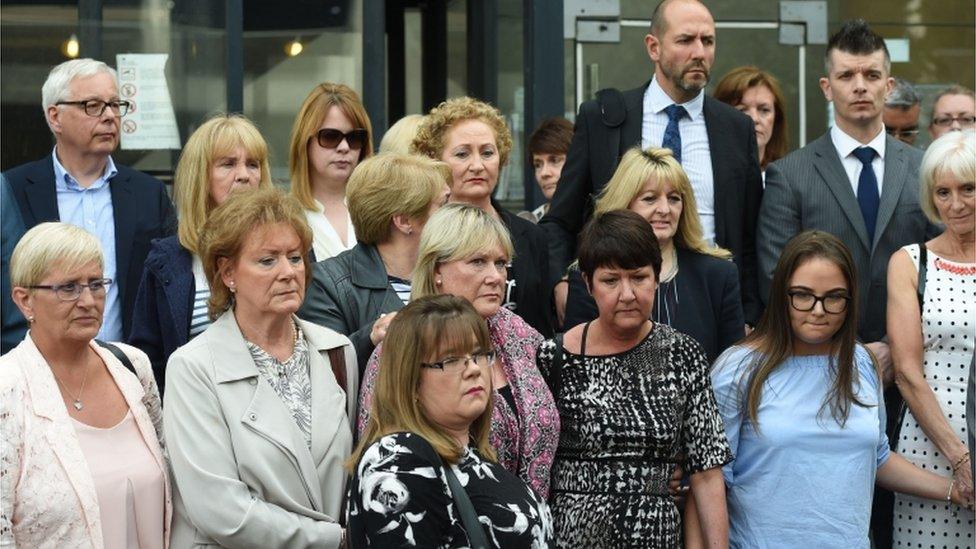
Victims outside Nottingham Crown Court after the disgraced surgeon was jailed for 15 years
The High Court is expected to rule later this year on whether Paterson's private patients will receive compensation. Paterson's own insurance of £10m has not yet been revoked, but is understood to feature a clause excluding cases of criminal negligence.
Spire Healthcare and the Heart of England NHS Foundation Trust, which lawyers claim did not pass on information to Spire about Paterson's activities, are also being pursued for compensation.
Between 1998 and 2011 Paterson was employed by the Heart of England trust in Solihull, despite the fact he had previously been suspended by Good Hope Hospital in Sutton Coldfield.
At about the same time as his arrival at the trust, he began taking on private work for Spire Healthcare at its Little Aston and Parkway hospitals.
Mark Sibbering, president of the Association of Breast Surgery, said the huge volume of operations Paterson carried out while at Spire was "off the scale".
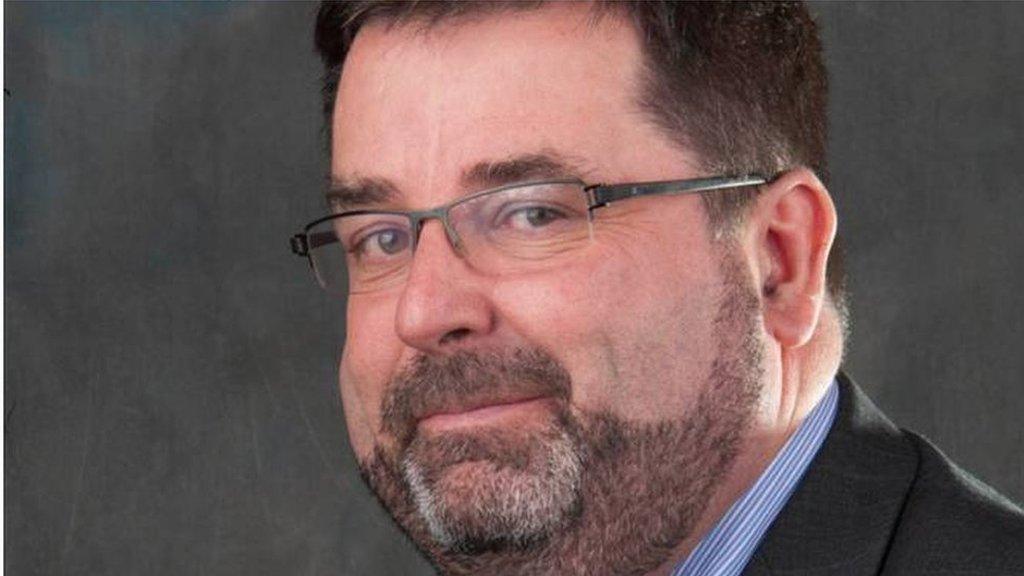
Mark Sibbering says there is a need to investigate the private sector in the wake of the Paterson case
"The number of patients he was seeing was astronomical and there was no input from anybody else," he said. "That was clearly a governance issue."
He said recent scandals in the NHS, such as the Stafford Hospital scandal and now the Paterson case, had led to a determination across the service never to let such things happen again.
However, the private sector still has questions to answer, he believes.
"What happened in the private sector has not been investigated fully yet," he said.
"There were a lot of issues, in that they allowed this to go on for such a long time and to such a degree. There's a need to look into that more."
Both Spire and the Heart of England trust say they have taken steps to ensure such a case could never happen again.
Spire said it was looking at ways of improving data collection and had commissioned a report which made a number of recommendations, including breast cancer patients being required to undergo scans and biopsies before having surgery.
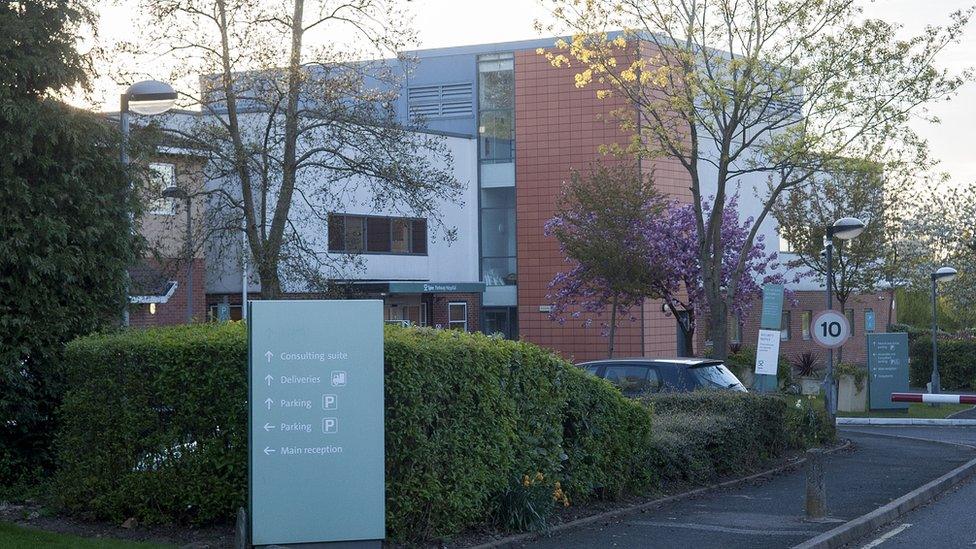
Paterson was found guilty of wounding patients at Spire private hospitals
A spokesman said: "As an independent hospital, Spire Healthcare operates in an environment which is highly regulated, and subject to strict governance requirements.
"Spire is regulated in exactly the same way as any NHS hospital, by the Care Quality Commission. As well as making notifications (where necessary) we are subject to regular inspections.
"We understand that Thompsons' campaign was prompted by the case of Ian Paterson. Issues of liability and compensation arising from Mr Paterson's activity will be addressed later in the year through a trial of lead cases.
"This approach was proposed by Spire as the fairest and quickest way to determine where responsibility for his actions lies; and all the lawyers representing Mr Paterson's patients, including Thompsons, agreed to the process.
"The Verita Report that we commissioned in light of the concerns about Mr Paterson made several recommendations, all of which have been implemented.
"Patient safety is at the heart of everything we do, and it is something to which we remain deeply committed."
Mr Hubard said regulation in the private sector had improved "out of sight" since the Paterson case.
"We have a wonderful private sector in this country - some of the best private hospitals that exist anywhere in the world and we are getting more and more patients from abroad coming to use them," he said.
"We are quite sure that the appalling circumstances of the Paterson case are most unlikely to be repeated because of the robustness of the regulations now in place but everybody needs to be vigilant."
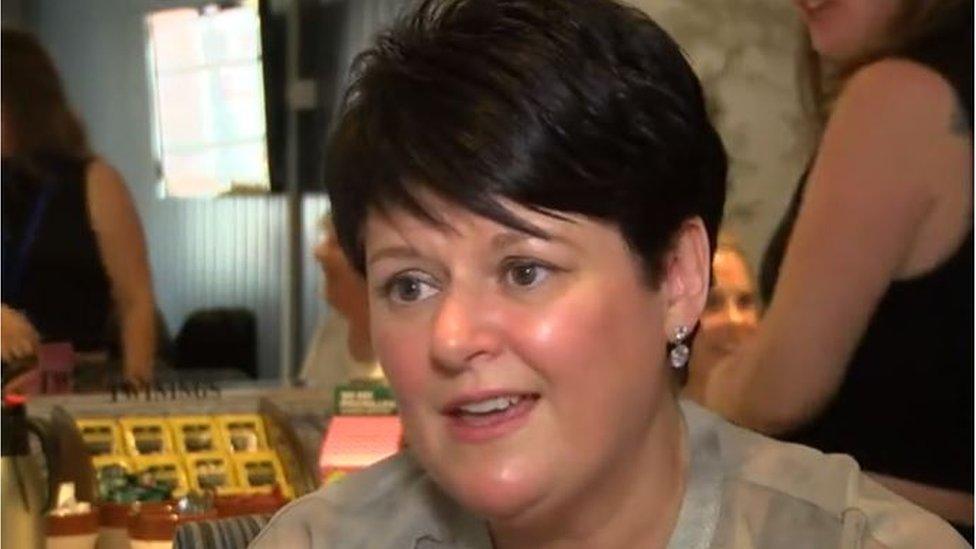
Christine Comerford said she no longer trusted private healthcare
Christine Comerford, from Kenilworth, Warwickshire, underwent two operations and several biopsies at the hands of Paterson, although she later learned she had in fact never had cancer.
She said she no longer trusted private healthcare and had cancelled her insurance scheme.
"I was paying £140 a month," she said. "The big difference is that if you are part of a private scheme, you get seen quicker.
"But if a mistake is made, people in the private sector don't hold their hands up.
"It's too much of a closed environment where people can do their own thing with nobody looking at them."
She added: "Spire made a lot of money from Paterson's work. Although you're not paying for the treatment, you get sent the invoices and it's phenomenal the amount insurance pays out.
"To say you've learned from your mistakes has become like a standard answer.
"It's true you will get rogues in every sector but they have to ensure people like Paterson can't get away with it for so long."
- Published31 May 2017
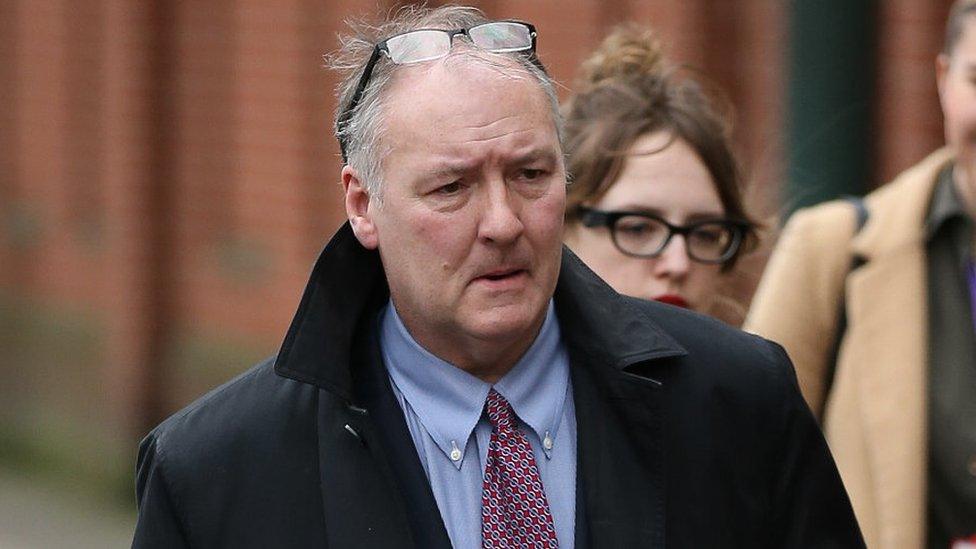
- Published28 April 2017
